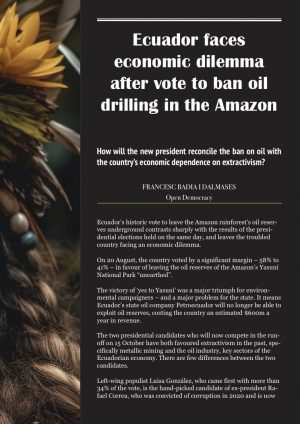 Ecuador’s historic vote to leave the Amazon rainforest’s oil reserves underground contrasts sharply with the results of the presidential elections held on the same day, and leaves the troubled country facing an economic dilemma.
Ecuador’s historic vote to leave the Amazon rainforest’s oil reserves underground contrasts sharply with the results of the presidential elections held on the same day, and leaves the troubled country facing an economic dilemma.
On 20 August, the country voted by a significant margin – 58% to 41% – in favour of leaving the oil reserves of the Amazon’s Yasuní National Park “unearthed”. The victory of ‘yes to Yasuní’ was a major triumph for environmental campaigners – and a major problem for the state. It means Ecuador’s state oil company Petroecuador will no longer be able to exploit oil reserves, costing the country an estimated $600m a year in revenue.
The two presidential candidates who will now compete in the run-off on 15 October have both favoured extractivism in the past, specifically metallic mining and the oil industry, key sectors of the Ecuadorian economy. There are few differences between the two candidates.
Left-wing populist Luisa González, who came first with more than 34% of the vote, is the hand-picked candidate of ex-president Rafael Correa, who was convicted of corruption in 2020 and is now self-exiled in Brussels. Right-wing businessman Daniel Noboa, the son of a banana tycoon, came second on 23%. Noboa’s success was a surprise – his support hadn’t topped 10% in pre-election polls, but he gained popularity after an eloquent performance in the final electoral debate.
History of the Yasuní referendum
The idea of voting to leave oil in the ground in Yasuní National Park – one of the most biodiverse areas in the world and home to at least two uncontacted Indigenous peoples, the Tagaeri and the Taromenane, who live in voluntary isolation in the Ecuadorian Amazon – was born in 2006. That was a year before Rafael Correa’s first electoral victory in 2007, and two years before the country became the first in the world to grant “rights of nature” as part of its new constitution.
The original proposal was to leave the Yasuní oil reserves untouched, in exchange for $3bn compensation paid by the world’s major economies, which would have to assume responsibility for a climate debt acquired over decades of greenhouse gas emissions from the burning of fossil fuels.
This idea was criticised as an attempt to commodify nature, so Correa’s government insisted on promoting carbon credit markets in exchange for keeping the oil under Yasuní, thus making the protection of nature conditional on the income it could receive in return. In 2013, when this goal was not achieved, Correa licensed the state oil company Petroecuador to drill the three oil fields of Ishpingo, Tambococha, Tiputini (ITT, also known as Block 43), located at the eastern edge of the park.
The state began to receive $148m dollars a year from ITT’s exploitation, while the opposition movement, including youth groups, Indigenous peoples and environmental NGOs, grew in size and strength. Despite active government repression, they spent ten years in the struggle, collecting tens of thousands of signatures in favour of a public vote on the exploitation of Yasuní.
Finally, in May this year, Ecuador’s constitutional court recognised the right to a referendum. The court agreed that if the ‘yes’ vote – yes to keeping oil in the ground – wins, the state will keep the oil reserves of Block 43 underground indefinitely and will be responsible for “a progressive and orderly withdrawal of all activities related to oil extraction within a period of no more than one year”.
After the overwhelming 17-point margin of victory for ‘yes’ in the 20 August referendum, this is what the new president and government will have to deal with.
Another referendum was also held in the district of the capital, Quito, this time on banning gold mining in the Chocó Andino highlands. The ban was approved by an even larger majority than in the case of Yasuní: 68% to 31%.
Uncontrolled violence
But these historic victories against the extractivism that dominates Ecuador’s economy stand in stark contrast to a political environment riven with endemic corruption, and an exponential increase in violence in a country once known in the region for its lack of violence.
Under the last president, Guillermo Lasso, violence rose from 5.8 to 26.7 homicides per 100,000 people. If it continues along the same trajectory, the country will end 2023 with a rate of 40 homicides per 100,000, making it the most violent in South America.
The rise is largely attributed to changes in drug trafficking in the region as a result of various factors including: peace agreements with the FARC guerrillas in Colombia; movements in the cocaine market, especially in the US, where demand is decreasing while demand for fentanyl is increasing; the booming European cocaine market; and the fact that Ecuador went from being a drug transit country to a distribution centre, especially through its ports on the Pacific.
However, the emergence of political violence during the election campaign was a shock. The murder of several local leaders culminated in the assassination of presidential candidate Fernando Villavicencio, an investigative journalist turned corruption scourge and vocal opponent of drug trafficking leaders. He was shot outside a Quito election rally on 9 August, just 11 days before the vote was due.
The political shock of the assassination significantly changed the dynamics of the candidates and the focus of the campaign, and saw Daniel Noboa, then ranked seventh, unexpectedly come second.
Analysts have pointed out Luisa González may have reached the electoral ceiling of 35% that correísmo – the political movement founded by Rafael Correa, which combines state developmentalism with social policies – has in Ecuador. Noboa’s potential for growth is much greater. But eight weeks is a long time in politics, especially in such a violent and volatile climate.
A key question for both candidates will be how they address the results of the Yasuní and Chocó referendums, as both are a long way from supporting a moratorium on extractivism.
Both correísmo and the forces of the right depend on the extraction industry (mainly oil, gold and copper) to raise funds to finance their policies. Whoever is elected president will only have a year and a half – this was a snap election called in the middle of a four-year mandate – to try to deal with an economy in crisis, significant emigration, uncontrolled violence, and pressure from drug trafficking barons. At the same time, they will have to implement the Yasuní agreement and restore the significant environmental damage already caused by the exploitation of Block 43.
The challenge for Ecuador’s embattled economy will be significant without the incomes from the Yasuní oil fields, which are responsible for about 12% of the country’s fossil fuel production. But if the country manages to resolve its internal disputes, it would be wise to join – wholeheartedly – the burgeoning coalition of Amazon nations trying to protect nature.
The coalition, led by Colombia and Brazil, does face difficulties. The final declaration from the Amazon Summit held in Brazil in early August failed to mention the Colombian government’s proposal to ban oil extraction in the Amazon. And there were no targets for a green energy transition, showing the Brazilian government wants to continue investing in Petrobras, the Brazilian oil behemoth – a policy that has caused tension within president Lula’s cabinet.
It’s not clear how Ecuador’s new president could honour the country’s pioneering constitution guaranteeing the rights of nature and the clear will of its citizens not to pursue the destructive path of extractivism while also boosting economic growth. But if she or he manages to do so, they will make a crucial contribution to decarbonisation and also send a message to the world that leaving fossil fuels in the ground is possible.
Originally published
by Open Democracy
September 5, 2023

